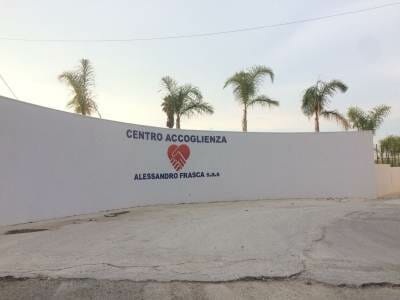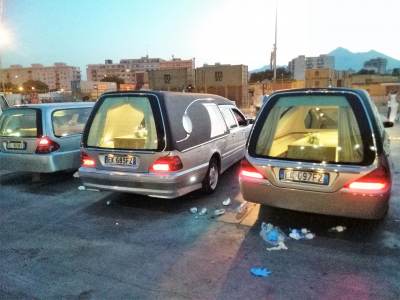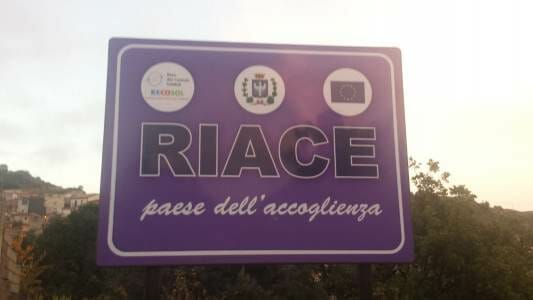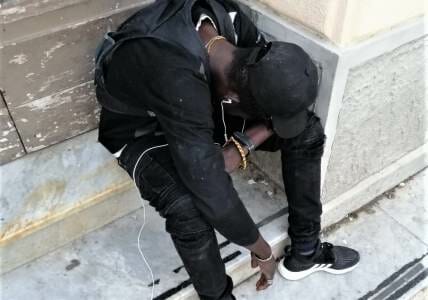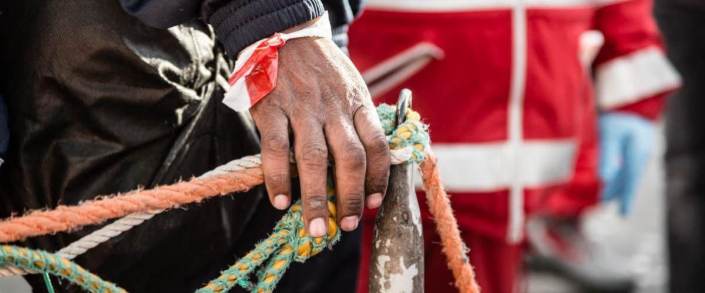The Emergency Hostel in Rosolini: Asylum Seekers With Restricted Movement
On August 2nd we returned to the Extraordinary Reception Centre* in Rosolini, managed by the company ‘Alessandro Frasca s.a.s.’, which currently houses 101 people, ranging from 18 to 30 years’ old. The majority are from Subsaharan Africa but there are also residents from Iraq, Pakistan, Bangladesh, Afghanistan and Egypt. The structure has a capacity of 118 places that can be extended up to 118, and in emergency situations has even reached 250 people. One June 1st the centre’s contract was renewed for another two years.
The staff is currently made up of four mediators, a psychologist and ten other workers, comprising of canteen staff, cleaners and drivers, as well as cook. During our visit we were accompanied by one of the centre’s cultural mediators, who explained that the centre has various agreements with the nearby parishes and the mosque in Rosolini, as well as with the local council with regards to socially useful work. As for the waiting time to formalie asylum requests and be heard by the Territorial Commission, the mediator tells us that these depend on the period, and that now the landings have diminished and the situation is more calm, the waiting times are shorter, around one months for formalising the C3 form and no longer than a month till the hearing. While speaking with some of the centre’s residents the situation seemed different however: two young men told us that they have been hosted at the centre for four months and have not provided their finger prints nor formalised their asylum request. The average time in the centre is one year, and a maximum of a year and a half they tell us, even if some of the residents present in the centre since 2016 waited up to 9 months in order to formalise their asylum request and, now engaged in an appeal, are still hosted by the centre.
The last transfer to a SPRAR* centre was in April 2018, although in the meantime many people have left the centre of their own accord. The most recent episode included 15 people the mediator tells us. Furthermore, the NGO Emergency comes once a week, as well as the centre’s psychologist. They are supported by the “Silver” project, financed by the fund for asylum, migration and integration 2014–2020*, which provides support in social inclusion within Sicily to migrants who are victims of serious psychological trauma.
There have been three eviction orders recently*, relating to events in February and March, while there have been no cases of voluntary repatriation through the IMO*, although one resident has been transferred to Sweden to join his wife and children, facilitated by the IMO.
Interaction with the local community is described as being difficult. The workers tell us about integration projects that comprise of visits by the centre’s residents to the local schools, but despite these initiatives the centre continues to forbid the residents to leave the building if unaccompanied, as we have already reported in the past. We ask about the reasons for this rule and the restriction of personal freedom imposed on the young men: the reason provided to us is the frequent cases of racism the migrants face, who – according to the mediator – soon accept this solution.
While talking with some of the young men hosted in the centre, it becomes clear that their main frustration is being confined to the centre for long period of time, without the certainty of how long this stay will last. Some of those awaiting their appointment with the Commission, ask us what it will be like and tell us that no one has ever prepared them for how to deal with it; the migrants engaged in appeals confirm this. Others ask us information about how they can reach members of their family in other European countries, and it seems that they are not familiar with the Dublin regulation and other basic information about the procedures relation to international protection. This incertainty regarding the steps for obtaining documents, their rights and possibilties contrasts with that which the mediator tells us about the presence of a lawyer int he centre who attentively follows the young men’s cases and the legal information apparently offered by the other staff members.
The centre provides activities including a film forum, sport, music-therapy, Italian language classes, manual activities like painting and there is a small library in construction. The organisation of these activities, however, seems more to act as a distraction from the residents’ lack of liberty, to which one can add the fact that some of them told us of having been in a minibus that comes directly to the centre to take them to work in the countryside fot eh day.
All of this contributes to a constant and systematic marginalisation of the asylum seekers, who frequently find themselves isolated and abandoned without the means to integrate themselves into the society where they leave. At the same times, the reception centres become pools of low-cost, foreign labour power in parts of southern Italy where there is a high concentration of agricultural work.
The building seems to be in good condition and with the decrease in the number of landings there is no problem of overcrowding, yet the illegal practice of retricting the residents’ freedom of movement continues, operating within the logic of an emergency management of immigration, confronted as a temporary crisis and not a structural phenomenon. This leads to a vision of migrants as foreign individuals in the area, with an inherent difficult in integrating. The limitation on their possibility to move freely in the streets of the city that hosts them, aside from being illegitimate and arbitrary, simply increase the perception of migrants as people to be kept at a distance, relegated to camps far from the eyes of other citizens. Yet again they are not people, but simply numbers to fill up centres and bodies to be put to work in the fields.
Beatrice Mariottini
Vittoria Fiore
Borderline Sicilia
*Extraordinary Reception Centre = CAS (Centro di Accoglienza Straordinaria)
*SPRAR = Sistema di protezione per richiedenti asilo e rifiugiati
*Fund for asylum, migration and integration = FAMI
*Eviction orders = revoche dell’accoglienza
*IMO = International Migration Office
Project “OpenEurope” – Oxfam Italia, Diaconia Valdese, Borderline Sicilia Onlus
Translation by Richard Braude

